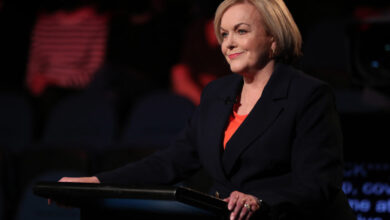By D. Kevin McNeir
Most of the nation’s attention continues to rest on the cities of El Paso and Dayton where families, friends and local officials struggle to make sense of last weekend’s two mass shootings that left a collective and rising death toll of 31 with dozens injured and still hospitalized.
But closer to home, community activists like D.C.’s Roach Brown, known for his zeal and commitment on behalf of returning citizens, has taken on another mission: finding solutions to the District’s rising gun violence.
On August 6 during Brown’s monthly “Crossroads Radio Show” (WPFW, 89.3 FM), which airs live every first Tuesday from Ben’s Chili Bowl in Northwest, he facilitated two panel discussions in a room filled with interested local residents for a lively two-hour conversation about the impact that escalating shootings have had throughout the District.
But his most ardent concern, he says, remains the rise of injuries and deaths among children.
“And it doesn’t matter what color these babies are. Nor do I care if they’re the children of Black folks or children whose parents are members of the Ku Klux Klan. Children deserve being protected and having the chance to grow up and go after their dreams. It’s our job to keep them safe,” Brown exclaimed.
Before turning the conversation over to his first panel, Brown pointed to poverty which disproportionately lays claim over Blacks in America as a significant reason for the frustration and disillusionment that have led to numerous examples of misdirected violence erupting in recent months in his hometown of D.C. as well as other mostly-Black urban cities including Baltimore and Philadelphia.
“Since the 40s when the U.S. government began to develop the projects where they ushered Black families in and forced us to live on top of one another, we’ve had to live like crabs in the bucket,” he said. “Each time the fire has been turned on, we’ve crawled over one another desperately trying to get out.”
Panelists for the first session, whose reflections mirrored the passionate pleas of the talk show host, included: co-host, Kymone Freeman, We ACT Radio; Tyrone Parker, director, The Alliance of Concerned Men; Minister Abdul Khadir Muhammad, Nation of Islam; and the Rev. Tony Lee, founder and senior pastor, Community of Hope AME Church.
“We have far too many guns on our streets and many of those weapons have been illegally acquired,” Parker said. “And while there are organizations like ours that are out in the community doing everything we can, we still haven’t received the full support of District government, particularly in terms of the kinds of resources that the City could but has yet to provide.”
“In addition, we are in short supply of men who are willing to join us. The numbers are simply inadequate given the challenges before us. Thirty percent of District youth are currently living in poverty. That’s something that city officials must address.”
“When an 11-year-old child was recently shot and killed in D.C. by another youth, the police found that the fight and shooting that subsequently occurred happened because the children were fighting for the right to control a street corner where they could make a few dollars selling legal goods to people in the community. They were trying to make a few dollars so they could make ends meet,” Parker said, adding that his organized has compiled a conflict resolution manual that many believe could positively change the mindset of youth if placed in the hands of the District’s public school leaders and utilized in classrooms.
Muhammad, a man who admits having once lived a life dominated by negative forces, agreed with Parker’s notion that changing the way youth think and often react when they feel threatened, remains the first step in reducing violence.
“Before our communities can be changed for the better, individuals have to regain control over their own minds,” he said. “Too many within the Black community have chosen to embrace a Satanic-led existence and have turned away from the Creator. It’s easy to understand why our children are in so much turmoil – in their homes they can easily pick up drugs, alcohol and guns all of which are just laying around on their parents’ kitchen tables.”
“Further, it’s imperative that we begin to agree to disagree in love. Even this panel illustrates the diversity within the Black community. But bickering among ourselves won’t get us anywhere. Even if those who are already out on the streets trying to bring peace in the hood don’t always see eye-to-eye, we can still work together,” Muhammad added.
Lee noted that viable solutions already exist but without financial support and a concerted effort to more effectively direct those resources, gun violence will inevitably continue to plague the city and its residents.
“Many activists are already on the scene, even before the police arrive, attempting to provide solace and some form of understanding when gunfire erupts – we often get there while the smoke from guns is still in the air,” he said.
“We don’t need to create strategies or look for answers – we already have them. But in the District, the vast majority of financial resources is going to building buildings rather than building people. Our City’s leaders don’t want to disrupt their program. Gentrification benefits those leaders who have found that it’s easy to paint our residents as barbarians so they can dismantle communities and move people so they can make way for business opportunities.”
“We must hold our leaders accountable and force them to transform people before transforming physical properties – a current policy that rarely benefits Blacks and more often bodes well for people who don’t have our welfare in mind and who don’t like anything like us,” Lee said.
This post originally appeared in The Washington Informer.





